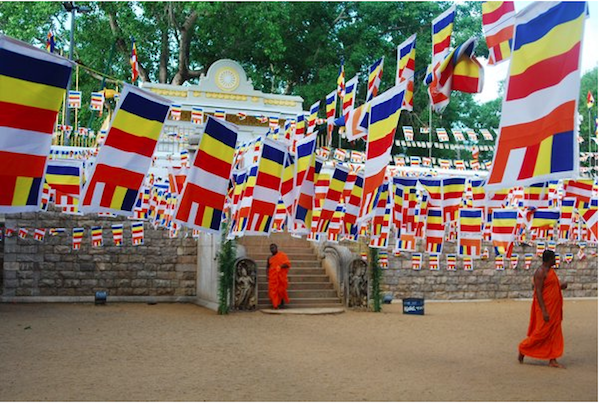
Image from Travel Blog
- Today, Wesak is the most revered day in the Buddhist calendar. Unfortunately, in Sri Lanka, the celebration is led by a small group of apparently sanctimonious humbugs followed closely by a larger herd of population of self inflicted ignorance. Their mutual objective being the public display of religious fervor through the performance of religious observations at the obvious expense of the practice of Buddhist precepts. It appears that they are trying to create an image of high standards of moral and ethical conduct despite their very apparent behaviour to the contrary.
- The negative reaction of the leadership to the UNSG’s request to respond to the POE report is the most powerful case in point. Their floundering behaviour of non- cooperation was followed by outright denial of allegations of war crimes and human rights abuses compounded by denigration of the UNSG and Panel of Experts by political buffoons even as country representatives at Wesak celebrations at the UN.
- The leadership’s blatantly immature and ill conceived response has aggravated doubts of their credibility. It would have made very good sense if they responded in a more rational and cooperative manner in keeping with international codes of diplomatic conduct expected of member nations of the UN and as responsible stake holders in the global system of international justice, protection and security.
- Their uncalled for aggressively defensive behaviour has made it quite obvious to even the most simplistic minded that they have much to hide.
- It is indeed sad that the few intellectual elite who have acquired their education at the highest fonts of western learning and currently serving the leadership in the international arena are unable to advice the leadership to act in a credible and responsible manner. Is it because their thirst for position and power exceeds their concern for national interest?
- The leadership could have defended war crimes allegations through a rational legal approach using international precedents as well as international law. Acceptance of the possibility of collateral damage and war crimes by some ill motivated members of the armed forces requiring investigation would have been the most realistic course of action.
- Unfortunately, aggravation of their self inflicted lack of credibility has legitimized the imminent possibility of a case for war crimes investigations by the International Criminal Court. The ongoing international investigations of similar incidents in other countries and their pretended indifference to the possibility of a similar fate befalling them is equally baffling, to say the least.
- In addition to the above, there is very little compassion shown by the leadership for Tamil survivors of the war and regret for the grievous collateral damage caused them as a consequence of a brutal war. In fact, their indifference to and denial of abuses and violence during the final stages of the war is a very explicit indication of their negative attitude towards genuine post war reconciliation.
- This is justification enough for suspecting the government’s guilt in deliberate neglect and targeting of innocent Tamil civilians caught in the cross fire of the final stages of the war.
- The leadership’s behavior is undeniably not in keeping with what the Buddha taught and is particularly glaring to many on this sacred day.